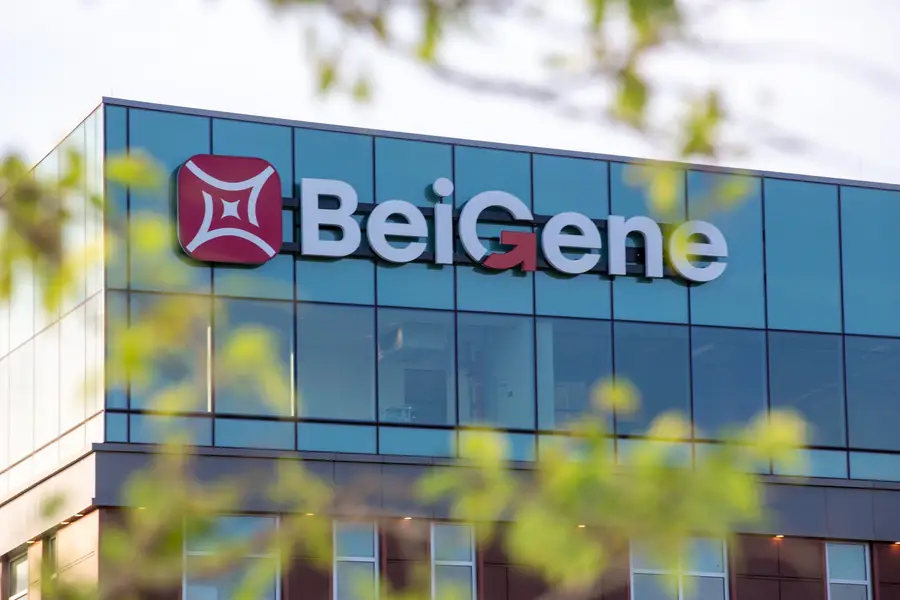BeiGene celebrates profit milestone on soaring drug sales

Buoyed by U.S. demand for its blockbuster cancer drug, the Chinese biopharma firm has delivered its first quarterly profit on a GAAP basis
Key Takeaways:
- Global sales of the company’s flagship drug for blood cancers rose 62% to $792 million in the first quarter, while U.S. sales reached $563 million
- BeiGene is adopting a new English name, BeOne Medicines Ltd., and is moving its headquarters to Switzerland
By Molly Wen
One of China’s leading makers of novel drugs, BeiGene Ltd. (688235.SH; 6160.HK; ONC.US), has arrived at a landmark on its earnings journey: its first quarterly profit.
That is, according to one widely accepted accounting measure. By another, it still has a few steps further to go. Investors have been eagerly tracking the company’s progress towards the breakeven point, hoping that growing demand for BeiGene’s blood cancer drugs would finally push its results definitively from the red into the black.
First-quarter earnings prepared under GAAP accounting rules for release in the U.S. market crossed that threshold into net profit, although the figures issued in China showed a lingering bottom-line loss despite a swing into operating profit.
The company publishes results in the three jurisdictions in which it is listed: Hong Kong, the United States and mainland China. On May 7 it announced a first-quarter net profit of $1.27 million (9.19 million yuan) on a GAAP basis, compared with a net loss of $251 million during the same period of 2024. Meanwhile, applying another accounting method for China, the company moved into operating profit and shank its net loss to 95 million yuan from 1.91 billion yuan in the same period last year.
The earnings spurt was driven by strong sales of its flagship oncology drugs. Product revenue rose 47% to $1.1 billion in the first quarter of 2025. Zanubrutinib, sold under the U.S. brand name Brukinsa, accounted for 70% of product sales. Demand for the kinase inhibitor, which blocks growth-related proteins in cancers affecting white blood cells, has been booming since U.S. regulators approved the drug to treat chronic lymphocytic leukemia and other cancers.
Zanubrutinib went on to achieve blockbuster status after breaching the $1 billion annual sales barrier in 2023.
Also driving the latest earnings are the PD-1 antibody drug tislelizumab and products licensed in from Amgen, BeiGene said.
Zanubrutinib sales jumped 62% to $792 million in the first quarter from the equivalent period of 2024, with $563 million in the United States alone. Expanded use among patients with chronic lymphocytic leukemia explains more than 60% of its quarter-on-quarter sales growth. Sales surpassed those of a competing drug co-developed by Johnson & Johnson and AbbVie, ibrutinib, making BeiGene’s product the market leader in the U.S. BTK inhibitor market. Meanwhile, sales in Europe surged 73% to $116 million on increased market penetration in Germany, Italy, Spain and France.
Sales of tislelizumab, which helps the immune system attack tumor cells, rose 18% to $171 million, outpacing equivalent drugs from Chinese drug companies after making inroads into overseas markets. The drug, which is marketed under the brand name Tevimbra, has been approved in 46 markets and was recently included in medical insurance schemes in the U.S., Europe and China.
Going for global impact
The overseas market is critical for the company, whose globalization strategy is gathering pace just as tensions are ratcheting up between China and the United States. Its original logo featured traditional Chinese calligraphy, but the company took on the English name BeiGene when it went public in 2021. It announced plans for another name change to BeOne Medicines Ltd. in November 2024, and said in its latest results that it would move its headquarters to Switzerland.
Pharmaceuticals are currently exempted from U.S. tariffs, but President Donald Trump has said medicines could be subject to new levies. U.S. production of the two BeiGene flagship drugs is all carried out by a U.S.-based partner with very limited involvement by Chinese suppliers. Thus, any tariffs targeting medical products are likely to have limited impact on the company, which inaugurated a new hub on the Princeton West Innovation Campus in Hopewell, New Jersey, in July last year. The base is equipped with world-class facilities to manufacture biologics as well as to conduct clinical research.
In European and U.S. markets, BeiGene cut sales expenses as a share of product revenue to 41% in the first quarter from 57% in the same period of 2024. The fact that rapidly rising revenue was accompanied by a mere 7% increase in sales and management expenses to $888 million points to improved operating efficiency.
The company has a lot riding on another potentially lucrative drug that targets a protein linked to cell growth. Its drug sonrotoclax, a BCL2 inhibitor, is aimed mainly at hematological tumors.
A marketing application for the drug has been filed in China and is being reviewed on a priority basis, while U.S. regulators have also granted the product fast-track status for use among patients with mantle cell lymphoma and a rare type of blood cancer.
The company currently trades at a price-to-sales (P/S) ratio of around 5.6 times in Hong Kong, compared with 6.6 times for Shanghai Junshi Biosciences (688180.SH; 1877.HK) which also sells PD-1 drugs overseas. As BeiGene starts to deliver profits and improve its operating cash flow, shareholders may enjoy a greater payback.
To subscribe to Bamboo Works weekly free newsletter, click here




